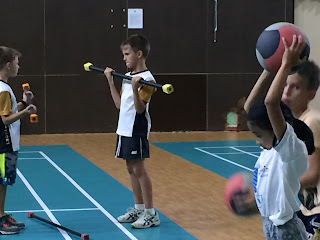Students in PAWS Class are learning about the "V" Formation... While teaching in Minnesota I first read “Lessons from Geese” that was largely based on the work of Milton Olson. I was the head gymnastics coach of a prominent high school and I was always looking for new activities to build teamwork. It is truly marvelous when groups of people are in sync. People feel more supported, people take healthier risks, and people in general are more successful and happier. In the event that a challenge arises, the group offers support, needed problem solving skills and resources to reach the intended goal. There is no doubt embracing a “V” formation within our own family as well as the PRIS community might be the best strategy for having a superb school year.
Want to know more? Check this out...
VIA Institute on Character
Teamwork
More on Teamwork
Encouraging the attitudes, knowledge and behaviors needed to make choices toward a healthy and fulfilling life. Wellness Matters!
Mind, Body, Go!

Pages
Thursday, September 17, 2015
Fitness, Friends and Fun!
Quantified Fitness Stars
Students in PE class are putting their muscles and mind to work! Fitbits are in action and minds are working. Students collect data before and after a fitness related activity. Data will be used to determine if movement related activities incorporated throughout their day help them to reach their full potential.
Students in PE class are putting their muscles and mind to work! Fitbits are in action and minds are working. Students collect data before and after a fitness related activity. Data will be used to determine if movement related activities incorporated throughout their day help them to reach their full potential.
Wednesday, September 9, 2015
Growth Mindset
What kids can do is largely dependent on what they think they can do. Students in PAWS (Positive Attitude and Wellness in School) classes are opening their minds to visualization, self-talk, goal setting and much more, to begin school with a brain map for learning!
Want to know more? Check it out...
More on Mindset in Schools
Mindset Works
About Mindset
The concept of “mindset” has gained increasing attention since Stanford University psychologist Carol Dweck introduced it in her 2007 book Mindset: The New Psychology of Success.
Those with a “fixed” mindset believe that people’s intelligence and abilities are static and outside their control—the widely accepted theory of cognitive development through the 1960s. In contrast, those with a “growth mindset” know that intelligence is dynamic. As neuroscience has now decisively shown, the brain does change based on one’s experiences and efforts.
Regardless of the research, all of us develop beliefs about our own intelligence, beginning in childhood. Some children worry that they don’t have enough. Others grow up thinking that they can do anything if they just work hard at it.
These beliefs make a big difference in how children do in school, research shows. Even students who consider themselves “gifted” often avoid challenge, for fear they might lose status if they fail. But when we teach youth that intelligence is malleable, they more readily take on challenges, persist through difficulties, and experience intellectual growth. (Blackwell, Trzesniewski, & Dweck, 2007)
Want to know more? Check it out...
More on Mindset in Schools
Mindset Works
About Mindset
The concept of “mindset” has gained increasing attention since Stanford University psychologist Carol Dweck introduced it in her 2007 book Mindset: The New Psychology of Success.
Those with a “fixed” mindset believe that people’s intelligence and abilities are static and outside their control—the widely accepted theory of cognitive development through the 1960s. In contrast, those with a “growth mindset” know that intelligence is dynamic. As neuroscience has now decisively shown, the brain does change based on one’s experiences and efforts.
Regardless of the research, all of us develop beliefs about our own intelligence, beginning in childhood. Some children worry that they don’t have enough. Others grow up thinking that they can do anything if they just work hard at it.
These beliefs make a big difference in how children do in school, research shows. Even students who consider themselves “gifted” often avoid challenge, for fear they might lose status if they fail. But when we teach youth that intelligence is malleable, they more readily take on challenges, persist through difficulties, and experience intellectual growth. (Blackwell, Trzesniewski, & Dweck, 2007)
Wednesday, September 2, 2015
Healthy Minds and Bodies Under Construction!
Physical education and physical activity in schools have been linked to positive academic achievement and many other benefits. "Study after study has affirmed the importance of play in children’s physical and mental health. It helps boost language development, problem solving, risk management and independent learning skills. Play is linked to improvements in academic skills, classroom behavior, healthy emotional attitudes and better adjustment to school life". Debbie Rhea
PE students balancing fitness and play!
Want to know more? Check it out...
Kids need to play at school
Note: Comments are moderated and for privacy reasons, cannot include students' names. Please direct specific inquiries via email.
PE students balancing fitness and play!
Want to know more? Check it out...
Kids need to play at school
Note: Comments are moderated and for privacy reasons, cannot include students' names. Please direct specific inquiries via email.
Subscribe to:
Posts (Atom)







